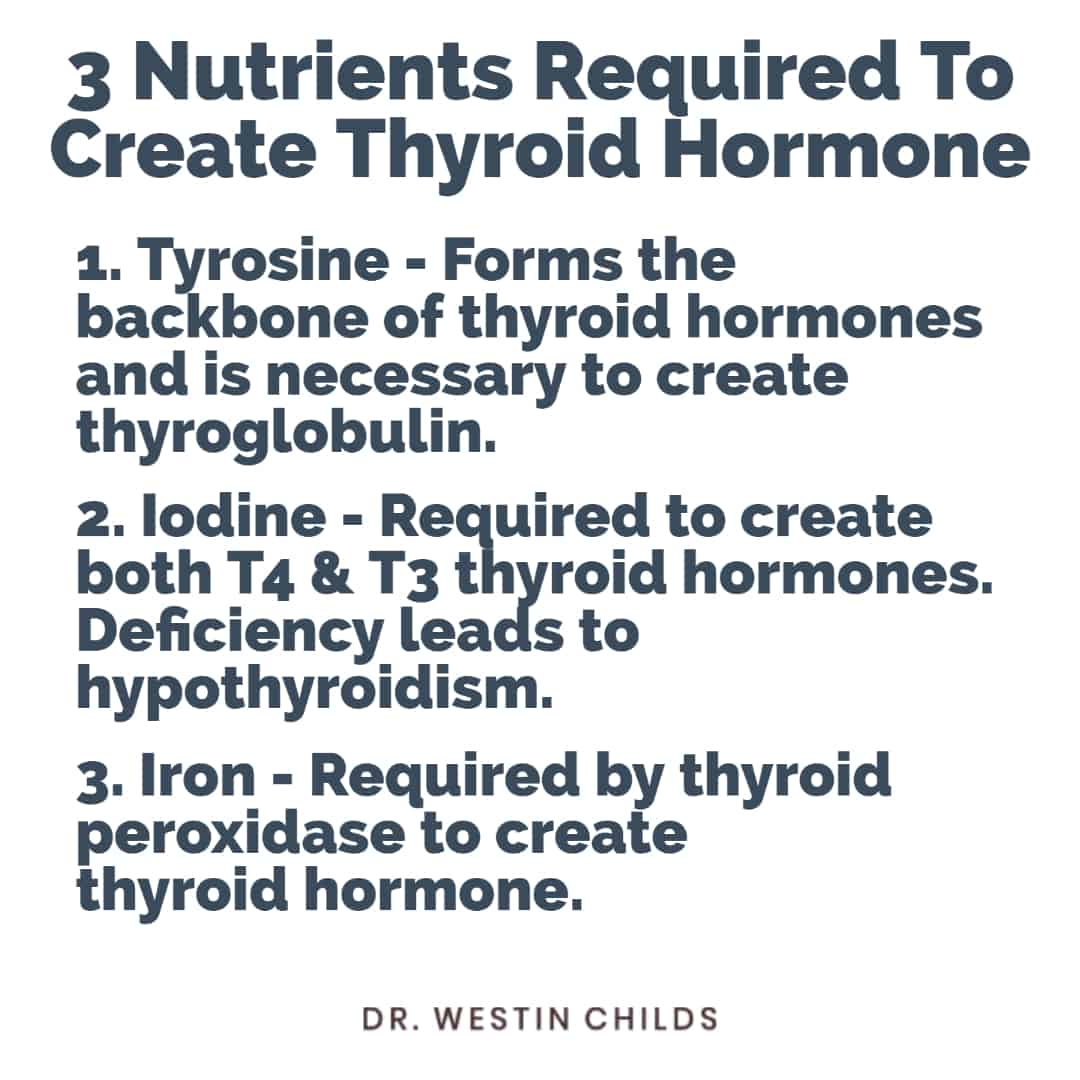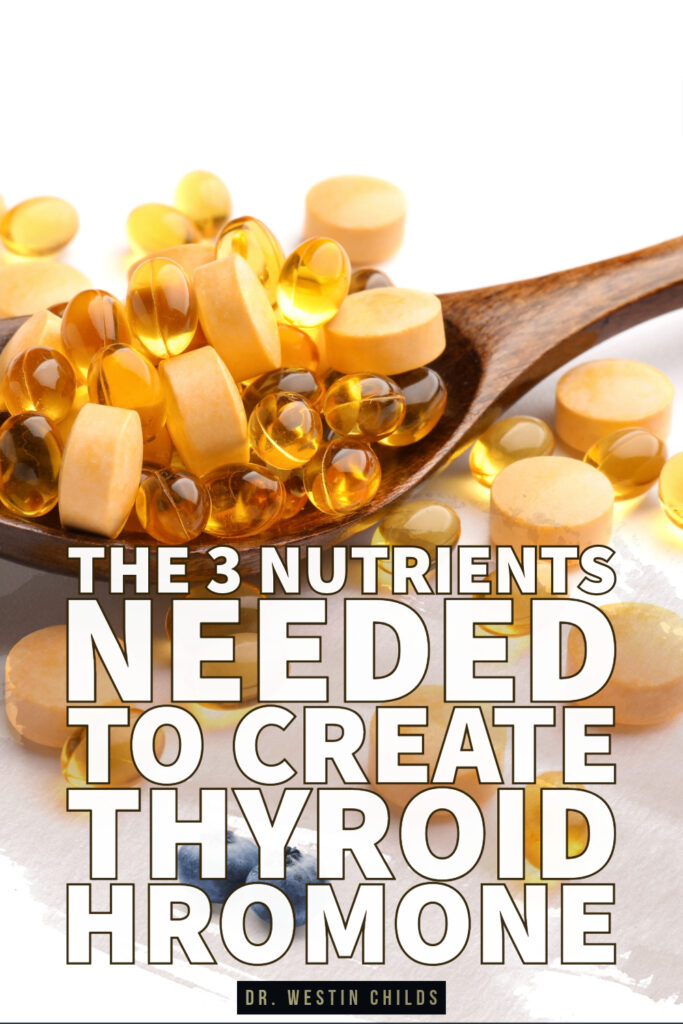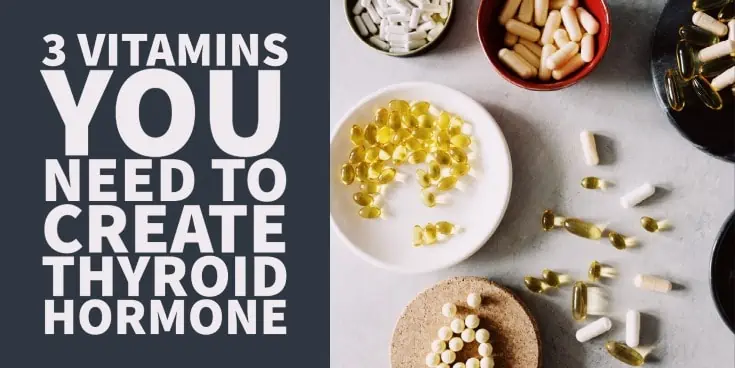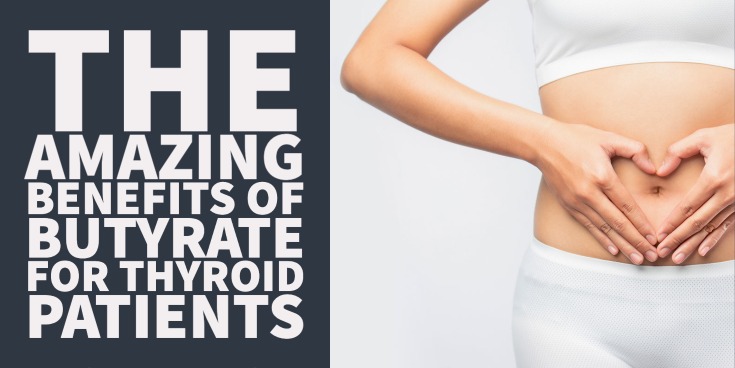It should come as no surprise that your thyroid requires certain vitamins in order to function, right?
Just like every other cell in your body, nutrients are required to catalyze reactions, create hormones, support cellular function, and help produce proteins.
When you are deficient in a nutrient involved in any of these reactions, you will start to feel symptomatic.
The same is true for your thyroid.
There are MANY nutrients involved in thyroid function and these nutrients help to support your thyroid in various ways.
Today, though, I want to focus on 3 nutrients that help your thyroid CREATE thyroid hormone.
But you should know that creating thyroid hormones is just the beginning.
In order for that thyroid hormone to be used by the body, it must be converted into active thyroid hormone and then utilized by your cells.
Different vitamins are involved in each of these steps.
Today we will focus on the 3 main ingredients required to produce thyroid hormone inside the thyroid gland:
A deficiency in any of these 3 nutrients may result in impaired thyroid hormone production and, therefore, decreased circulating thyroid hormone.
That’s just a fancy way of describing a sluggish thyroid or something known as hypothyroidism.
Today you will learn why these vitamins are so important, how they work in your thyroid gland, what happens when you don’t have enough, how to know if you are deficient, and how to replace that deficiency (if it exists).
Let’s jump in:
DOWNLOAD FREE RESOURCES
Foods to Avoid if you Have Thyroid Problems:
I’ve found that these 10 foods cause the most problems for thyroid patients. Learn which foods you should avoid if you have thyroid disease of any type.
The Complete List of Thyroid Lab tests:
The list includes optimal ranges, normal ranges, and the complete list of tests you need to diagnose and manage thyroid disease correctly!
The 3 Main Nutrients Required For Your Body To Produce Thyroid Hormone:
Why is this information important?
Because nutrient deficiencies are very common among thyroid patients.
It’s not uncommon for thyroid patients to have one or more nutrient deficiencies that negatively impact how well their thyroid is working.
Understanding how these deficiencies impact your thyroid provides you with a way to naturally improve your thyroid.
If you can replace those deficiencies then you can support your thyroid, and help it produce more thyroid hormone, which will ultimately help you feel better.
The reason thyroid patients experience symptoms such as weight gain, fatigue, hair loss, and depression is that they don’t have ENOUGH thyroid hormone.
Increasing how much thyroid hormone is in your body can help control and alleviate these symptoms.
And the best part?
You don’t need a doctor to write you a prescription.
These nutrients are available over the counter and can be purchased and managed by thyroid patients fairly easily.
The only time you may need a doctor is to order lab work to see if you are iron deficient which we will talk more about below.
#1. Tyrosine
First up is tyrosine.
Tyrosine is an amino acid, which means it’s a protein, and it’s important because it forms the backbone of the thyroid hormones.
In the most basic sense, tyrosine forms the backbone of thyroid hormone (1) and provides a scaffold to which iodine can attach.
The combination of iodine plus tyrosine then forms the different types of thyroid hormone.
If 4 iodines are attached to tyrosine we call that compound T4 or thyroxine.
This, by the way, is the same hormone found inside thyroid medications like levothyroxine and Synthroid.
If 3 iodines are attached to tyrosine then we call that compound T3 or triiodothyronine.
This, by the way, is the same hormone found inside thyroid medications like Cytomel and liothyronine.
You can identify the type of thyroid hormone created by your body by counting how many iodines are attached to it.
The location of the iodine matters as well because if the iodine is in a different place then that changes how well that thyroid hormone will function.
As an example, reverse T3, which is an anti-thyroid metabolite, is formed with 3 iodines and a single tyrosine but the iodines are in a slightly different position.
As you can see, you pretty much can’t form thyroid hormone without having tyrosine.
Tyrosine also performs another important function for your thyroid by creating something called thyroglobulin.
Thyroglobulin is another protein found inside of your thyroid gland and it’s made up of hundreds of tyrosines locked together (2) in a long chain.

And the job of thyroglobulin is to basically smash two halves of thyroid hormone together to form a full thyroid hormone.
These small halves of thyroid hormone are called monoiodotyrosine (3) and diiodotyrosine.
Monoiodotyrosine is one iodine attached to a tyrosine backbone and diiodotyrosine contains 2 iodines attached to a tyrosine backbone.
Thyroglobulin can smash 2 diiodotyrosines together to form T4 thyroid (2 iodines on each means 4 iodines total) hormone or it can smash 1 diiodotyrosine and 1 monoiodotyrosine (1 iodine + 2 iodines means 3 iodines total) together to form T3.
If this is confusing you, then just ignore it.
What you really need to understand is this:
Tyrosine is not only required because it forms the backbone of thyroid hormone, it’s also required to create thyroglobulin which is required to smash thyroid hormone together.
If you don’t have enough tyrosine then you won’t be doing either of these jobs very well and you may end up with a sluggish thyroid!
This all begs the question: do you have enough tyrosine in your body for this to occur?
And when it comes to tyrosine deficiency, it’s actually not that common.
Tyrosine is a protein which means that if you are consuming high-quality protein each and every day, you are probably getting enough from your diet.
It’s pretty rare to see tyrosine deficiency in your diet unless you have a strange diet that omits quality protein.
So for most people, tyrosine deficiency isn’t usually a problem.
But, because of the importance of tyrosine in other areas of the body, there may be an increased demand for tyrosine which pulls tyrosine from your thyroid for elsewhere in the body.

Tyrosine is used to create certain adrenal hormones (including epinephrine and norepinephrine) as well as melanin (which is found in the skin).
What ends up happening to some people is that they have an increased DEMAND for tyrosine in other areas of their body which pull or draw from the tyrosine that their thyroid could otherwise use.
This is especially true in times of stress when your body needs to produce more adrenal hormones and could also be possible in cases where more melanin production is required in the skin.
If tyrosine is being used by these other tissues then there may not be enough to go around.
Because of this, it is a good idea for people to consider using supplemental tyrosine each and every day just to ensure that your thyroid has what it needs to create thyroid hormones.
You can take tyrosine via supplements in the form of L-Tyrosine.
If you feel that you need extra tyrosine for your thyroid then you will want to take around 150mg of L-tyrosine daily.
Reasons to take L-tyrosine include situations in which you are under a lot of stress and there is high demand for hormone production, in situations in which you don’t think you are getting enough tyrosine from dietary sources, and as a preventative measure if you just want to make sure you are getting enough every day.
#2. Iodine
If tyrosine forms the backbone then you can think of iodine as the arms of thyroid hormone.
You can’t form thyroid hormone if you are missing the backbone (tyrosine) and you can’t form thyroid hormone if you are missing the arms (iodine).
The fact that iodine is so important for thyroid function is probably not a surprise to most of you.
Iodine is well-known among thyroid patients and even doctors.
What you may not realize, however, is just how common iodine deficiency is.
Many people, and doctors, just assume that they are getting enough iodine from their diet, but this isn’t always the case.
In fact, it’s much more likely that you are iodine deficient than anything.
These 3 reasons explain why:
- The first is that people are consuming less iodine each and every day – The #1 most consistent dietary source of iodine is sea vegetables like seaweed. Now ask yourself this, when was the last time that you consumed seaweed? Are you having 3-5 servings of seaweed every week? If not, then there’s a good chance that you may be deficient in iodine. Public health officials know this, by the way, which is why salt was iodized (4). Extra iodine was added to salt with the belief that people were much more likely to consume salt than seaweed so even if you weren’t eating sea vegetables you could get your iodine through salt. Iodizing our salt worked initially but has become less effective in recent years. More and more people are using salts NOT fortified with iodine such as Himalayan pink salt and Celtic sea salt for cooking, baking, and seasoning. In addition, many people are AVOIDING salt for reasons that we will talk about below.
- The second is that people, thyroid patients especially, have a fear of iodine – Reason #2 is that many thyroid patients have what I refer to as an irrational fear of iodine. Thyroid patients have been told that iodine is harmful to their thyroid gland and that it may cause harm if they consume it. This really isn’t true but it doesn’t stop huge percentages of thyroid patients from avoiding iodine in most of its forms.
- And the third is that more and more people are avoiding salt – As I mentioned previously, more and more people are avoiding salt because they have been told to by public health officials. It’s widely thought that consuming salt may increase blood pressure which is why there are so many low sodium foods out there. People avoiding salt also intentionally do not salt their food as much which reduces how much iodine they get from salt sources.
Why is this a problem?
Because your body can’t produce iodine on its own (5), you must get it from your diet.
And, for the reasons mentioned above, many people are NOT getting it from their diet.
We know this because urinary rates of iodine concentrations (6) have been decreasing over the last several decades.
The United States has virtually eliminated the obvious signs of iodine deficiency, such as goiter, cretinism, and spontaneous abortion, but this doesn’t mean that low-grade iodine deficiency doesn’t exist.
In fact, it’s probably low-grade iodine deficiency that is at least partially linked to many cases of hypothyroidism.
The good news is that iodine-induced hypothyroidism (7) is a treatable and reversible cause of thyroid dysfunction.
The bad news is that many thyroid patients are actively avoiding iodine because they believe that it is dangerous.
Not only is iodine necessary for thyroid function and thyroid hormone production, it’s also required in other cells in your body.
Iodine is particularly needed in breast tissue, your eyes, stomach lining, salivary glands, arterial walls, and more.
Avoiding iodine is not only a problem for your thyroid but for other tissues as well.
This is true even if you don’t have a thyroid gland, by the way!
Regardless of how you feel about iodine, it is needed by your body and your thyroid.
As a thyroid patient, you should look to consume anywhere between 150 and 250mcg of iodine per day.
You can get this iodine from both dietary sources AND supplement sources but keep in mind that the iodine content in food can vary quite dramatically.
This is just a ballpark range, though, as some thyroid patients consume up to 12.5mg (yes, MG!) of iodine per day.
Put into perspective, 1mg = 1,000mcg. So 12 mg of iodine is 12,000 mcg of iodine per day.
Be cautious with high doses of iodine, though, as it may cause issues in certain individuals.
#3. Iron
Even though we are talking about iron last, it may be the most important.
Here’s why?
Iron is required for a protein called thyroid peroxidase to function.
Thyroid peroxidase helps create thyroid function by helping thyroglobulin do its job.
Remember thyroglobulin? The long chain of tyrosines?
In order for thyroglobulin to smash two halves of thyroid hormone together, it must have two halves.
And these halves need iodine.
Well, thyroid peroxidase helps provide iodine for thyroglobulin (8) so it can smash the two halves of thyroid hormone together.
Thyroid peroxidase transforms iodine into iodine so that it can be attached to thyroglobulin.
And thyroid peroxidase is what is called heme-dependent.
Heme-dependent is just a fancy way of saying that it is iron-dependent.
If you don’t have enough iron in your thyroid gland then thyroid peroxidase won’t be able to do its job (9) and that means thyroglobulin won’t be able to do its job and that means you won’t be able to create thyroid hormone.
Thyroid hormone production comes to a halt fairly quickly in iron deficiency, which happens to be quite common among thyroid patients.
That’s because thyroid hormone is necessary for iron absorption in the GI tract.
Low thyroid states make it so that your stomach is less efficient at absorbing iron which can cause iron deficiency.
Iron deficiency then worsens thyroid function (through the events listed above) which then makes absorbing iron even more difficult in a vicious cycle.
This is why I said that iron is probably the most important of the nutrients listed here.
Even in the face of adequate tyrosine and iodine, iron deficiency can prevent thyroid hormone creation.
For this reason, you should ALWAYS check your iron levels if you have a thyroid problem.
Why? Because if iron deficiency is not corrected then using supplements such as tyrosine and iodine may have no benefit until the iron component is fixed.
Even though iron is a critical mineral required for thyroid function, you should only take it if you actually need it.
It’s usually not harmful to supplement with nutrients if you don’t know your nutrient status because the body does a pretty good job at regulating how much it needs.
For instance, it’s pretty much impossible to overdose on vitamins like vitamin B12 because any excess B12 will just be eliminated by the body.
But that’s not true for iron.
Taking iron when you don’t need it may cause or exacerbate iron overload syndromes.
Because of this, I can’t give you a range of how much iron you should be taking because you should get tested before you decide to use it.
You can test for iron deficiency by looking at the following lab tests:
- Ferritin
- Serum iron
- TIBC
- % Saturation
Have your doctor order these tests to see if you need to take iron.
Lastly, if you are a woman, you should be aware that your menstrual cycle may impact your iron levels.
If you tend to have longer periods or a heavy flow, you are at increased risk of developing iron deficiency.
Any condition that results in blood loss, even a small amount, has the potential to cause iron deficiency and this includes the menstrual cycle.
Do These Nutrients Work If You Don’t Have a Thyroid?
I know this question will pop up for many thyroid patients who don’t have a thyroid.
And the answer is simple:
If you don’t have a thyroid anymore then these nutrients will not help you produce more thyroid hormone.
Once your thyroid gland has been removed surgically (via thyroidectomy) or irreversibly damaged (from radioactive iodine ablation) you are 100% reliant upon thyroid medication as your source of thyroid hormone.
Instead of a thyroid gland producing thyroid hormone, you will have to take your thyroid medication by mouth to get it into your body.
So boosting the creation process will have no positive impact if the thyroid gland is missing or non-functional.
However, that doesn’t mean that you shouldn’t take them because other tissues in the body still need them.
Iodine is still necessary for your breast tissue, eyes, nervous system, and arteries.
You still need tyrosine to create adrenal hormones.
And you still need iron.
Even though these nutrients won’t help you produce more thyroid hormone, all hope is not lost.
Instead of focusing on supplements that promote thyroid hormone production, you will want to focus on supplements that assist your thyroid medication in doing its job.
There are still many supplements that you can take if you don’t have a thyroid and they are listed here.
Final Thoughts
These are the 3 big vitamins that are required for thyroid hormone production.
Technically, they aren’t vitamins, but that doesn’t make them any less important for your thyroid.
The good news is that replacing a deficiency in these nutrients has the potential to help your body produce more thyroid hormones and help you manage your symptoms.
Remember:
The symptoms of low thyroid come because you don’t have enough thyroid!
And there are more ways than one to increase thyroid hormone, you don’t have to rely 100% on your thyroid medication to do all of the heavy liftings.
Now I want to hear from you:
Is this the first time you have heard about these nutrients?
Did you learn anything about how thyroid hormone is created?
Are you already taking iodine, tyrosine, or iron?
If so, did you see an improvement in how you are feeling?
Let me know in the comments below!
Scientific References
#1. https://pubmed.ncbi.nlm.nih.gov/5327670/
#2. https://pubmed.ncbi.nlm.nih.gov/30886364/
#3. https://www.sciencedirect.com/topics/neuroscience/monoiodotyrosine
#4. https://pubmed.ncbi.nlm.nih.gov/8494259/
#5. https://pubmed.ncbi.nlm.nih.gov/15142639/
#6. https://www.cdc.gov/nchs/data/hestat/iodine.htm
#7. https://www.liebertpub.com/doi/10.1089/105072501300176462
#8. https://www.ncbi.nlm.nih.gov/pmc/articles/PMC5841765/
#9. https://pubmed.ncbi.nlm.nih.gov/12487769/









